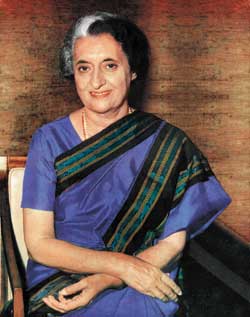Indira Gandhi
by Rameshraj[ Edit ] 2010-01-05 10:14:10
Indira Gandhi

Born in the politically influential Nehru Family, Gandhi grew up in an intensely political atmosphere. Her grandfather, Motilal Nehru, was a prominent Indian nationalist leader. Her father, Jawaharlal Nehru, was a pivotal figure in the Indian independence movement and the first Prime Minister of Independent India. Returning to India from Oxford in 1941, she became involved in the Indian Independence movement. In the 1950s, she served her father unofficially as a personal assistant during his tenure as the first Prime Minister of India. After her father's death in 1964 she was appointed as a member of the Rajya Sabha by the President of India and became a member of Lal Bahadur Shastri's cabinet as Minister of Information and Broadcasting.
The then Congress Party President K. Kamaraj was instrumental in making Indira Gandhi the Prime Minister after the sudden demise of Shastri. Gandhi soon showed an ability to win elections and outmaneuver opponents. She introduced more left-wing economic policies and promoted agricultural productivity. She led the nation as Prime Minister during the decisive victory in the 1971 war with Pakistan and creation of an independent Bangladesh. A period of instability led her to impose a state of emergency in 1975. Due to the alleged authoritarian excesses during the period of emergency, the Congress Party and Indira Gandhi herself lost the next general election for the first time in 1977. Indira Gandhi led the Congress back to victory in 1980 elections and Gandhi resumed the office of the Prime Minister. In June 1984, under Gandhi's order, the Indian army forcefully entered the Golden Temple, the most sacred Sikh shrine, to remove armed insurgents present inside the temple. She was assassinated on October 31, 1984 in retaliation to this operation.
